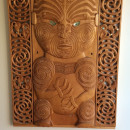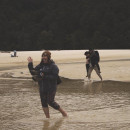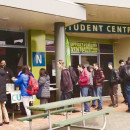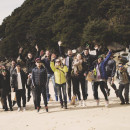CA Student Studying Abroad in Aotearoa New Zealand Past Review
By A student (Native American Studies & Sociology, California State University - Humboldt State University) - abroad from 07/17/2017 to 11/24/2017 with
NMIT - Nelson Marlborough Institute of Technology: Study Abroad, South Island, New Zealand
Although I was prepared to experience culture shock, I was amazed by how much I learned about the country and its people, and how they perceived the U.S. Having grown up in the U.S., I would say that Aotearoa New Zealand is not that different from the U.S. in many aspects. I am also grateful to have learned so much about the Māori peoples and other Pacific Islanders, as well as people from Asia and the Middle East.
Review Photos




Personal Information
| How much international exposure did you have prior to this program? | 1 month - 6 months |
Review Your Program
|
* Overall educational experience
Academic rigor, intensity, resources, etc. |
The education system at NMIT is different than that of the CA university systems. There is a larger independent study portion the student is expected to complete. Also, breaks from classes fall on different schedules depending on the student's focus area and progress. Further, I wanted to focus on Māori studies as much as possible. I was not able to exclusively take Māori classes as I attended during the spring semester and most of NMIT's Māori studies are held during their fall semester. Even with this challenge, NMIT was super helpful in accommodating classes that covered Māori topics. I was fortunate to take an introduction to Māori language class, Te Reo Māori, participate in a weekend-long cultural ceremony at Onetahua Marae (sacred meeting grounds) through a counseling, and focus on a Māori experience for a photography project. Classes are typically three hours every other day and noon is reserved for all students and staff to have lunch. |
|
* Host Country Program Administration
On-site administration of your program |
The student association on campus is constantly feeding students, hosting events and providing trips to local beaches, parks, and to another NMIT campus. These opportunities really helped me meet and bond with other stuents, especially at the beginning of the semester. As the students become busier during the semester, these events and trips became a great way to catch up with friends and meet new people. The administrators of the exchange program were always very helpful when I had questions and would check in on me. They made sure to connect me with other exchange students and local kiwi students at the beginning of the semester. I was asked to participate in a study abroad marketing opportunity and loved every minute of the process because I was able to share my experience. |
|
* Housing:
How satisfied were you with your living arrangements? |
Since I was only attending for a semester, I wanted the most convinient housing. I lived at the Nikau Apartments that are located next to campus but are not campus housing. The Nikau Apartments provide housing for many NMIT students as well as tourists visiting the area. These apartments did have strict restrictions that sometimes interfered with the student night life, for example. However, if you are okay with following the rules and being respectful, you will not mind the restrictions. Nikau also pairs students by gender and have set room inspections every month. In my experience, I lived with a local kiwi and two different international studuents, one from Thailand and the other from Japan. |
| * Food: |
The food is not entirely different than that of the U.S. I ended up eating a lot of Thai and Indian food, and of course, fish and chips. I was also introduced to Māori kai (food) and I loved it! It actually made me become fond of kūmara (sweet potato). Lastly, I come from a Mexican background and I love traditional Mexican spicy food. With this said, I did not consider that I was going to struggle to find authentic and good Mexican food while abroad. There are some Mexican restaurants, but I chose to not eat there as the food was not authentic and I am very strict with what is considered Mexican food. This is just a personal preference. I did discover some Latinx restaurants, mainly from Argentina and Chile, while traveling around the country. |
|
* Social & Cultural Integration:
How integrated did you feel with the local culture? |
Nelson is a smaller area, but there is a lot to do. There are numerous beautiful hiking places and beaches, local rugby games and a lively night scene. It is important that you are comfortable with safely exploring your surroundings and making friends with folks who have a car or learning how to use public transportation. NMIT staff and student association do a great job at sharing information about popular places and providing tours and trips. What was extremely helpful for me was that I enrolled in a tour of Nelson at the beginning of the semester. Later on, we went on trips outside of Nelson that allowed students to bond and visit places that would otherwise require transportation. Nelson has a great nightlife that is mostly located on one block. People tend to typically go out on Saturdays and most places close by 3am. I love to travel and learn about new places and their traditions. While in Aotearoa New Zealand, I was fortunate to visit four cities: New Plymouth, Rotorua, Wellington, and Auckland. I had a blast attending an All Blacks and local Tasman Mako's rugby game, Māori cultural tourism, museums, local music and arts festival, and concerts (e.g. Māori reggae artists and U.S. artists like J Cole). For all of my trips I stayed at hostels becuase it was the cheapest. This was my first experince staying at hostels and I loved it. Hostels are super common in the country, compared to CA. I would recommend you talk to the local kiwis about cheapest airlines to travel with. |
|
* Health Care:
How well were health issues addressed during the program? |
At the beginning of the semester, all students must attend an orientation which covers healthcare information for study abroad students. NMIT also has various staff groups that periodically check in with you to make sure you are doing okay mentally and physically and to assist you with anything else that comes up. I did have to go to a local pharmacy to ask for allergy medicine and the experience was similar to visiting a pharmacy in the U.S. Other than this, I did not have any experiences with healthcare. |
| * Safety: |
I felt safe throughout my stay in Aotearoa New Zealand. I did not witness anything out of the ordinary, but I am also very cautious about my surroundings, avoiding sketchy places and going out super late into the night. |
| If you could do it all over again would you choose the same program? |
Yes
I would definitely do the program all over again given the opportunity. The campus and education system at NMIT is unique and different than what I was used to in the states. Classroom sized are small and personalized, which allows you to build relationships with those around you. |
Finances
|
* Money: How easily were you able to live on a student's budget?
(1 = not very easy/$200+ on food & personal expenses/week, 2.5 = $100/week, 5 = very easily/minimal cost) |
During my stay abroad, I was good at being thrifty and budgeting meals, weekend outings, and travel expenses. With this said, I had the privilege of taking out loans to pay for all expenses so that I did not have to worry about running low on finances. However, if I remember correctly, I spent around $100 every two weeks on groceries at the cheapest supermarket. |
| Do you have any general money-saving tips for future study abroad participants? | Talk to other students and ask about the thrifty places to shop at. When I first arrived, an NMIT support staff showed me where the nearest market was located. Although this market was closer to campus, it was also more expensive. I would also suggest that you plan out meals and set aside money to spend on self-care activities, if you do not do this already. I also walked everywhere and only paid for cab rides when necessary. |
Language
| * Did your program have a foreign language component? | Yes |
|
How much did the program encourage you to use the language?
0 = No encouragement, 5 = frequent encouragement to use the language |
|
| How would you rate your language skills at the beginning of the program? | None |
| How would you rate your language skills at the end of the program? | Beginner |
| How many hours per day did you use the language? |
Direct Enrollment/Exchange
| * Did you study abroad through an exchange program or did you directly enroll in the foreign university? | Exchange |
Other Program Information
|
* Where did you live?
Select all that apply |
|
|
* Who did you live with?
Select all that apply |
|
|
* Who did you take classes with?
Select all that apply |
|
| About how many local friends did you make that you will likely keep in touch with? |
A Look Back
| * What did you like most about the program? |
|
| * What could be improved? |
|
| * What do you know now that you wish you knew before going on this program? | 1) It took me a while to adjust to the large independent study portion the student is expected to complete at NMIT. In my opinion, the CA university systems provide clear (and strict, at times) guidelines on topics covered in the course. I say this because there were times I felt that I was over searching topics and felt I did not have clear guidelines. 2) Try to learn the slang and difference between English words used in the U.S. and Aotearoa New Zealand. |
Reasons For Studying Abroad
| To help future students find programs attended by like-minded individuals, please choose the profile that most closely represents you. |
The Academic or LinguistYou went abroad with specific academic goals in mind; the program credentials and rigor of your coursework abroad were very important to you. You had a great time abroad, but never lost sight of your studies and (if applicable) were diligent with your foreign language study. Good for you! |








